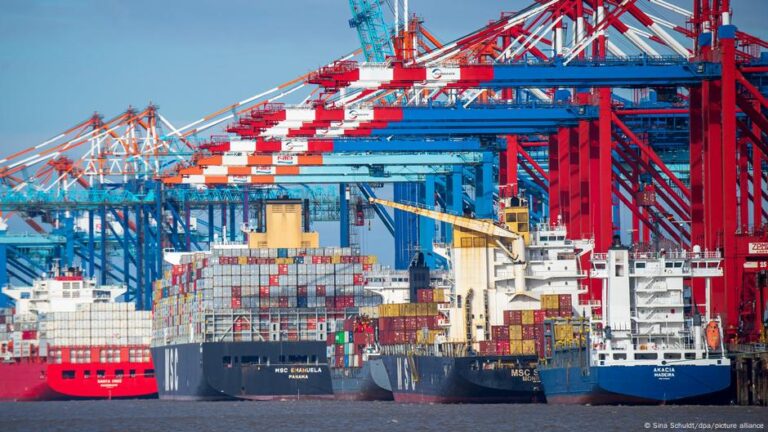Trade protectionism is nothing new in human history — not even in export-driven Germany, where in the 19th century, then-Chancellor Otto von Bismarck attempted to introduce protective tariffs on wheat imports.
Pushed by a strong farmers’ lobby in the parliament, Bismarck’s tariffs were intended to curb growing imports of cheap wheat from other European countries — a goal which eventually failed.
Since US President Donald Trump is known for his own, very unique take on history, he didn’t hesitate to usher in a new era of protectionism, aiming to shield and isolate the world’s largest economy through an aggressive tariff policy.
“Most Western economies owe a large part of their prosperity to free trade,” says Carsten Brzeski, chief economist at Dutch bank ING. “That’s now being rolled back, and it will take time before we see a new balance.”
Pointless knee-jerk reactions
Brzeski believes it would be foolish to immediately respond to Trump’s policy with retaliation, even more so as more than a week after the US president had made his “liberation day” announcement of so-called reciprocal tariffs a clear US strategy has yet to emerge.
“Responding to Trump right now makes little sense. His policies are too erratic for that,” Brzeski told DW.
Nevertheless, the European Union has already tested the waters, threatening specific retaliatory tariffs, for example, on motorcycles and bourbon whiskey. But bourbon was later taken off the list after Washington hinted that French and Italian red wine could be the next target.
A closer look at the reciprocal tariffs list reveals who Trump is really going after. It’s the countries that are running a large and what he calls “unfair” trade surplus with the United States that are causing the president’s ire. First and foremost, “China, Canada, Mexico, and Germany,” said Brzeski.
Despite Trump’s apparent disdain for the EU, the 27-nation bloc as a whole isn’t his primary target. That role is reserved for China — America’s strongest contender for the title of world’s largest economy.
Subsequently, the Asian economic powerhouse has been hit with the biggest duties — a staggering 145% on all of its goods exported to the US, as the White House confirmed on Thursday (April 10).
Brussels waiting for Berlin to lead retaliation
But economists Marc Schattenberg and Robin Winkler from Deutsche Bank Research believe Germanywon’t be able to escape the tariffs, urging German politicians to enter the fray.
The tariff shock, they wrote in a research note, has “increased pressure on the next federal government to defend the competitiveness of the German economy in an increasingly challenging global environment.”
That observation cuts to the heart of Germany’s current political dilemma. Following snap elections in March, a new German chancellor has yet to be elected and new ministers are waiting to be appointed.
With Germany in political limbo for a while longer, the EU is devoid of a strong voice from Europe’s biggest economy. Fortunately, the European Commission has agreed not to act hastily and instead pursue negotiations.
Germany’s export-dependent economy, meanwhile, has much to lose from a trade war between the Trump administration and much of the rest of the world. Industries such as automobiles, chemicals, machinery, and pharmaceuticals have a strong presence in the US markets.
A loss of US market share, argues Brzeski, may “not sound dramatic” at first glance given that only about 3% of the EU’s gross domestic product (GDP) is tied to US exports. But in Germany, “hundreds of thousands of jobs” depend on exports to the US.
Moreover, if Trump succeeds in pushing Chinese suppliers out of the US market, Beijing could be tempted to dump its heavily subsidized excess capacities on the European market, undermining entire industries here.
No benefits in a trade war
ING’s Brzeski thinks that, “over time,” German businesses with a focus on domestic markets could reap some benefits from a shift in trade patterns. But even those won’t “escape the dance,” he added, as disruptions in export industries would inevitably ripple through the broader economy.
And what about relocating German operations across the Atlantic — a primary goal of Donald Trump’s trade policy?
“During the final years of the Biden administration and the Inflation Reduction Act, many European companies were already considering that,” said Brzeski, as deregulation, lower energy prices, and tax cuts made the US “even more appealing.”
But at the moment, the US president’s “erratic” economic policies and tariff chaos have created “major doubts about legal certainty, and few business leaders are in a hurry to move there.”
As Europe scrambles to find an appropriate answer to expanded US tariffs, policymakers are considering levying a digital tax on America’s Big Tech corporations.
But Fabian Zacharias, managing director of Germany’s digital industry association, Bitkom, warns against using what’s come to be called Europe’s “nuclear option” in the trade war.
“Imposing a European digital tax would be the worst possible response. Trying to answer a trade policy issue with a new tax is completely misguided,” he recently told Redaktionsnetzwerk Deutschland — the joint newsroom of Madsack Media Group. Instead, he advocates for “medium-term deescalation.”
A different option has been suggested by Gabriel Felbermayr, head of the Austrian Institute of Economic Research (Wifo). As the EU can impose export duties on goods leaving its customs territory, the instrument could be used to tax goods the US must source from Europe.
Felbermayr told DW that high-tech machinery for semiconductor production, currently produced almost exclusively in Europe by Dutch company ASML, could be targeted.
A hefty export tax on those machines would cost US companies dearly and potentially force the US government to compromise.
Brzeski, however, isn’t convinced by an export levy on such goods. “It would be better if [EU] policymakers now focused all their efforts on investments, structural reforms, reducing bureaucracy, and deeper integration like a capital markets and defense union,” he told DW. Such reforms, he added, could achieve “far more than a long list of retaliatory tariffs.”
This article was originally written in German.


